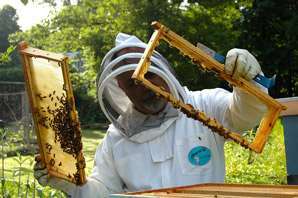
How to become a Certified Beekeeper
Are interested in becoming a beekeeper and want to know how to get into the occupation? If you are, then you will find this post really useful.
It provides in depth information about the occupation and how you can get the needed training and become a certified beekeeper.
Continue reading:
Who is a Beekeeper?
Apiarists, apiculturists or beekeepers are people commonly known for managing and maintaining colonies of honey bees kept in hives or apiaries, harvesting beeswax, honey, pollen and royal jelly.
Beekeepers must have interest in working outdoors and within natural environments.
Patience is one of the attributes you may need, coupled with a love for bees, and prudence working in and around the hive.
Starting out on your own may be the best approach towards beekeeping, to gain skills and knowledge before joining a beekeeping association.
Educational Requirements and Career Pathway for Beekeepers
There is no formal educational requirement for becoming a beekeeper, but it will be helpful to complete coursework in Botany, Biology, Agriculture, Horticulture, and Environmental Engineering.
Studying these courses will give you the necessary knowledge you will need to be successful as a beekeeper.
With the knowledge you’ve acquired from the coursework, you will:
- Know about various types of plants and the nutritional values of the pollen they produce
- Have the ability to identify different diseases associated with bees and how to treat them effectively
- Know how bee reproduces
- Know various grades and categories of honey
- Know how to market honey and other beehive by-products.
Beekeeper Skills
Here are skills needed if you must succeed as a beekeeper:
- Knowledge of the yearly cycles and behaviors of bees
- Knowledge needed for approaching bees
- Knowledge of types of plants and their life cycles
- Knowledge of plant seasonal production of nectar
- Ability to extract and process bee products such as honey, beeswax, pollen, and royal jelly
- Ability to recognize bee diseases and how to control them
- Knowledge of how to use beekeeping equipment such as bee smokers and hive tools
- Business skills
- Hive making and repairing ability.
Training Requirements for Beekeepers
Your fellow beekeepers will help you acquire the necessary skills and knowledge you need, especially when you are a member of a local beekeeping association.
The association may offer you full training covering subjects like recognizing disease and apiary management.
How to Obtain Training and Certification in Beekeeping
Aspiring beekeepers need to obtain certification in order to gain recognition. Obtaining certification is a way of showing proof of your claims as a beekeeper, and you will meet more job opportunities than when you are not certified.
Here are some beekeeping training and certification programs:
The British Beekeepers Association Certification
The British Beekeepers Association (BBKA) offers a basic assessment in beekeeping, which is the fundamental requirement for all other examinations and assessments you might take to be certified.
It is a practical assessment that tests the basic knowledge and skills of the craft. The under 18 candidates can take the Junior Certificate before the Basic if they decide.
Other BBKA certificate examination includes:
- General husbandry certificate
- Advanced husbandry certificate
- Written module examinations
- Microscopy Certificate
- Show Judge.
Beekeeping topics under module include:
- Honey bee diseases and poisoning
- Honey bee biology
- Honey bee products and forage
- Honey bee management
Junior Certificate Examination
The Junior Certificate examination is for those under 18 who want to test their beekeeping knowledge.
The exam is designed for those who are not qualified for the Basic Assessment.
The Junior Certificate will test the candidates’ interest in beekeeping, and render the courage needed before sitting for the Basic Assessment.
To apply for the Junior Certificate Examination you need to complete the Application Form and send it with the required fee to your area examination secretary or, if an individual member, direct to the National Beekeeping Center at Stoneleigh.
The area examination secretary will organize the assessment and contact you with the details. If you are successful and pass your fee will be refunded.
The four elements of Junior Certificate are as follows:
- Ten minutes oral questions
- Short written paper
- Making a frame
- Present your beekeeping diary
The National Diploma in Beekeeping (NDB)
The National Diploma in Beekeeping, NDB, was introduced to meet the need for a beekeeping qualification above the level of the certificates awarded by the United Kingdom National Beekeeping Associations.
The Diploma stands as the beekeeping qualification most recognized in the United Kingdom, placing its holders high within the beekeeping education.
Master Beekeeper Program (MBP)
The Master Beekeeper Program, MBP, is a five-year beekeeper training and certification program organized by the University of Florida.
Before joining the program, you must already be a beekeeper, and meet and pass the apprentice requirements and exams.
There is no age-limit for the program, as long as you can pass the examination. No student is allowed to skip any level as all students must enter the program at the apprentice beekeeper level.
The Master Beekeeper Program trains and educates beekeepers on latest tips, tricks, potential problems, equipment, knowledge, and techniques with the aim of improving their skills.
The four levels of training and advancement offered by MBP are:
- Apprentice Beekeeper
- Advanced Beekeeper
- Master Beekeeper
- Master Craftsman Beekeeper
Licensure in Beekeeping
Beekeeping license can be obtained according to the licensing authority of the state where you operate as a beekeeper.
You have to make inquiries of the requirements of licensing in the state where you function.
Job Duties and Responsibilities of a Beekeeper
The duties and responsibilities of a beekeeper include:
- Keeping beehives healthy and productive
- Preparing bees and equipment for pollination activities
- Feeding bees and producing honey
- Cleaning and treating the beehive when health problems occur
- Replacing combs and queen bees
- Keeping bee colonies prepared for production
- Ensuring food reserve in the colonies
- Preventing diseases attacking the colonies
- Collecting and packaging honey, pollen and beeswax
- Marketing hive products to consumers and distributors.
Where Can Beekeepers Find Jobs?
Beekeepers typically work as owners and operators of apiaries producing and supplying their own honey for food production and distribution companies. They own large hives for keeping bees.
Some other beekeepers work for large companies that specialize in production and distribution of honey and other bee products.
These companies own big factories and employ a large number of beekeepers to assist them in their gigantic productions and sales of bee products.
The Basic Salaries of Beekeepers
The amount of earnings for beekeepers depend on certain factors, such as level of experience, place of work, number of hives under their control, and employment experience.
There is no specific income information for beekeepers, but there is a general idea of income according to the earning levels of some workers in the occupational groups.
The United States Bureau of Labor Statistics states the median salary of workers in the ‘Farmers, Ranchers, and Other Agricultural Managers’ occupational group to be $60,750 per year.
Furthermore, the average salary of workers in the ‘Farmers and Farm Managers’ occupational group according to Service Canada is $22,122 per year.
According to the 2011 Alberta Wage and Salary Survey, the average earnings for Albertan workers in the ‘Farmers and Farm Managers’ occupational group ranges from $21.73 to $27.45 per hour.












